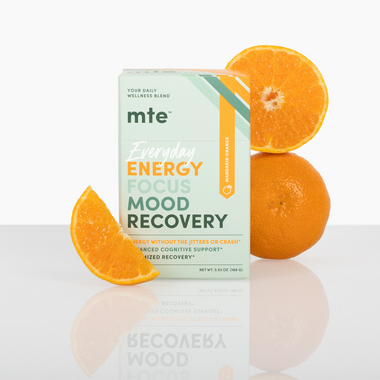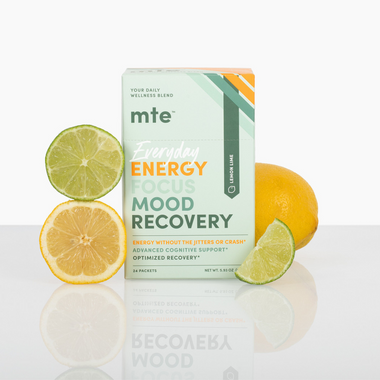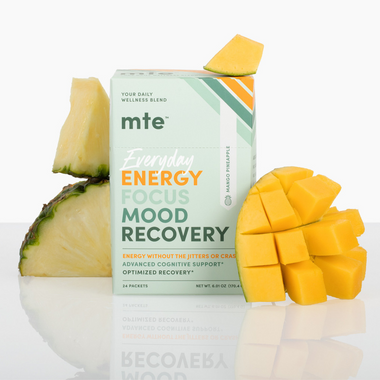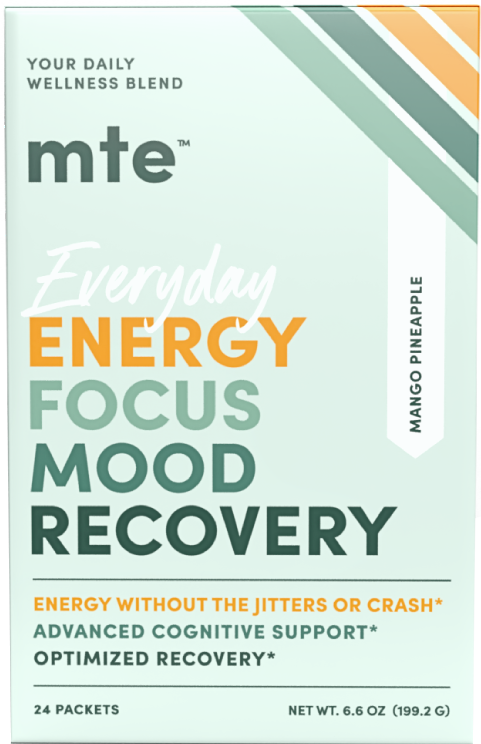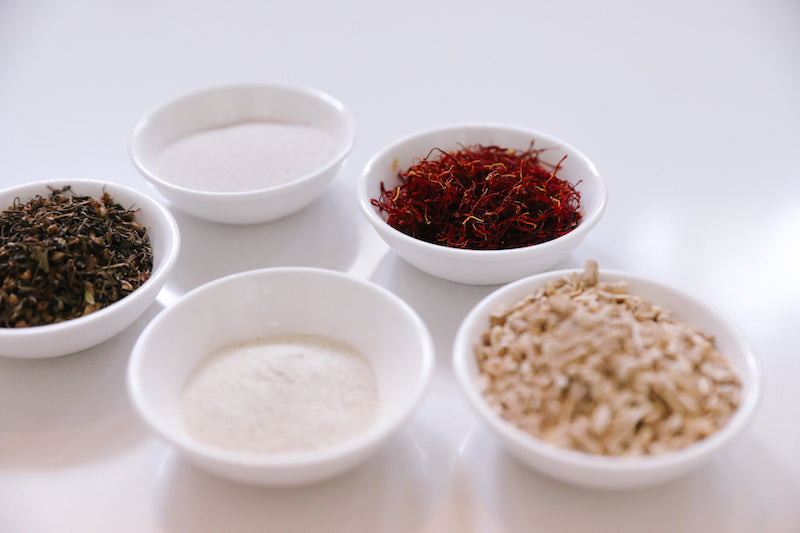
Adaptogen Stacking: 5 of Ashwagandha’s Best Sidekicks
Biohack. Adaptogen stack. Wellness pack. The lingo is pervasive. But just because somebody slaps a buzzword on a product shouldn’t automatically earn it a blue check – there’s a finesse to wellness.
This is leaning spoken word…
Exactly 0 people who’ve reached this article in their search for the best adaptogen stack haven’t heard of ashwagandha, and it is definitely one of those ingredients that healthy energy drink companies lean on as proof they’re effective. And for good reason – which we’ll get to in a minute.
The question is whether or not an adaptogen stack is making the most of its ashwagandha. When combined with complementary adaptogens, ashwagandha’s widespread bioactivity has a mutual enhancement effect on both adaptogens. You want to know what else an adaptogen supplement has in it and why. But before that, you want to know to look for.
An Introduction to the Ashwagandha Of it All
For an in-depth look at ashwagandha’s history and adaptogenic effects, you should check out our deep dive article: Understanding Ashwagandha: From Ancient Ayurvedic Medicine to Modern Health & Wellness. It’s giving TL;DR. It’s giving unhealthy fixation. And so here, we’ll endeavor to limit the millennia-long legend of Withania somnifera into just 200 words:
Ashwagandha has been used an energy supplement since people wrote in Sanskrit – 6000+ years ago. Meaning “smell of a horse”, it was believed that an ashwagandha energy drink gave you the strength of a horse. A standalone Rasayana in Ayurvedic medicine for thousands of years, this adaptogen is revered as a rejuvenator. Across the ancient world, it was written in every major pharmacopoeia, used for everything from immunity, strength and endurance to rheumatism, respiratory conditions and childhood illness.
Today, you’ll find ashwagandha in mainstream medicine across the eastern hemisphere. Here, we’re a little slower on the uptake. But as nutritional science progresses, we’ve learned more about the important compounds in ashwagandha that bring all that great bioactivity. Since we can study those compounds’ effects on cells directly in a lab setting, ashwagandha has become less of a mystery and more of a marvel.
And studies support ashwagandha as a rejuvenator! Just a few studies on the abilities of ashwagandha as an adaptogen have found evidence that ashwagandha may aid in:
- Mood management and boosting low mood
- Cognitive function and mental health
- Gut health and metabolism
- Executive function
- Reaction time and recovery
Studies say ashwagandha is also safe in high doses.
This multifaceted adaptogen is great on its own – no question – but like all adaptogens, nootropics and superfoods, the more the merrier! (Within reason.) The right combination of adaptogens results in a stack that is more than the sum of its parts. And if it’s an ashwagandha stack, you can be sure it’s effective.
Adaptogens tend to have generalized effects, so many have overlaps in their bioactivity. That makes certain adaptogen stacks and pairings especially potent. Through some examples of the best adaptogens to stack with ashwagandha for your targeted benefit(s), we’ll learn that a well-researched adaptogen and nootropic drink can leverage ashwagandha to create a product that supports foundational wellness, not just energy:
Adaptogens for Energy & Performance
Ashwagandha’s OG purpose was energy and vitality, so it tracks that studies support this adaptogen as an energy booster:
- A 2015 study saw 8 weeks of ashwagandha supplementation result in increased VO2 Max over placebo, and overall increased quality of life (QOL) scores over placebo.
- A 2022 study saw 8 weeks of ashwagandha supplements increase muscle strength and size, reduced exercise-induced tissue damage, and significantly larger decrease in body fat percentage compared to placebo.
Cordyceps – the non-zombie-creating kind – is considered a functional mushroom that offers several adaptogenic benefits, including energy support:
- In a 2015 study, long-term, daily cordyceps consumption resulted in significantly increased time to exhaustion and significantly improved VO2 Max.
- A 2020 study explored the mechanism of cordyceps and found that it increased ATP synthesis. ATP is basically cellular energy currency.
Maca root is a staple energy-booster in South America for as long as ashwagandha has been in Asia. Studies indicate there’s science to back up tradition:
- A 2009 study observed significant improvements in 40km ride times and libido in male bikers who consumed maca supplements
- A 2022 study on daily fatigue saw 4 weeks of maca supplements significantly improve energy levels, with an especially large effect on adults under 45 years old.
Adaptogens for Stress Support
Ashwagandha also fights the effects of stress and prepares the body to better respond to future stress, which has been reflected in modern research:
- A 2019 study had subjects take ashwagandha daily for 60 days. Results indicated ashwagandha statistically significantly reduced stress scores on one clinical scale and had a near-significant effect on another.
- A 2021 study on chronic high stress observed 6 weeks of ashwagandha supplementation significantly reduce scores on a clinical inventory for generalized anxiety, with measured effects increasing significantly at 2 weeks and even greater at 6.
Rhodiola rosea is probably the second most well-known adaptogen in this small crowd of rare plants. As a stress reducer and protectant, studies indicate:
- A 2015 study saw 14 days of rhodiola supplements result in significant alleviation of generalized anxiety with a significant improvement in overall mood.
- A 2012 study on life stress symptoms observed 4 weeks of rhodiola consumption result in consistent, steady improvements in perceived stress, quality of life, fatigue, and mood with results at 4 weeks being significantly more than at 2.
Siberian ginseng (eleuthero) isn’t a ginseng, but it carries many of the same abilities as its more famous cousins, one of which is promoting stress resilience. The WHO has some pretty high opinions of it, citing indications eleuthero works from the inside out to fight stress. Research indicates it may:
- Improve mental and physical performance under stressful conditions
- Decrease susceptibility to infection under stressful conditions
- Improve subjective quality of life and performance at work
- Increase levels of immunocompetent cells and T cells
- Suppress stress-induced organ and tissue damage
Adaptogens for Better Focus
Ashwagandha has also demonstrated the potential to support, promote, and even protect cognitive function on a cellular level:
- A 2021 study saw 30 days of ashwagandha supplements observed statistically significant differences in executive functioning, psychomotor speed, visual memory, cognitive flexibility and reaction time compared to placebo.
- A review of the literature cited two studies on cognition, including one where ashwagandha seemed to halt and even restore some synaptic death in adults with neurodegeneration, and another where the same phenomenon was seen in children with TBIs.
Magnolia vine is a staple in Chinese medicine and cuisine because it is super weird in a bunch of cool ways. As far as cognitive health goes, research supports this adaptogenic berry as a focus-booster:
- In a 2010 study, a single dose of magnolia vine resulted in statistically significant improvements in attention, speed and accuracy during stressful cognitive tasks.
- A 2013 study found evidence that magnolia vine saw significant attenuation of dementia-induced memory impairment accompanied by hippocampal support.
Bacopa monnieri is another name you often hear in the adaptogen world, but not one people know much about. But science indicates one of its benefits is cognitive:
- A 2008 study on older adults saw bacopa supplements improve scores on several clinical indices for learning, focus, working memory, and recall while improving scores on indices measuring perceived quality of life.
- In a 2015 study, 12 weeks of daily bacopa consumption improved speed of visual information processing, learning rate and memory consolidation.
Adaptogens for Sleep Health
Ashwagandha’s positive effects on sleep are likely a symptom of its positive effects on stress resilience and energy levels, but they exist nonetheless. Some indications that ashwagandha is a sleep-supporting adaptogen include:
- In a 2021 study, 8 weeks of ashwagandha supplements resulted in significant sleep improvements that were larger in the subjects with reported insomnia.
- A 2020 study on non-restorative sleep saw 6 weeks of ashwagandha consumption result in a 72% increase in reported sleep quality along with improvements in mental, physical and environmental improvements in perceived quality of life. These were accompanied by monitoring data that showed significant improvements in sleep efficiency, duration and latency.
Goji berry is another staple in Eastern traditional medicines because it’s a multifaceted adaptogen, similarly to ashwagandha. Studies show one of its benefits may be improved sleep health:
- A 2008 study saw 14 days of goji berry consumption significantly improve ratings for sleep quality, ease of awakening, daytime energy and alertness, and contentment
- A 2012 analysis of clinical trials reported that subjects experienced significant improvements in sleep quality, stress, ease of awakening, and focus.
Jujube is a superfood not only packed with nutrition but also with adaptogenic bioactivity. Unquestionably, it’s got serious potential as a sleep aid:
- A 2023 study saw significant improvements in several sleep parameters that indicated jujube has a direct antagonistic effect on GABA-ergic activity.
- A 2021 study tested 3 weeks of twice-daily jujube seed capsule supplements and observed significant improvements in overall sleep quality.
Adaptogens for Mood Management
Yet another talent of ashwagandha, it promotes mood directly and indirectly, offering support that’s uplifting yet tranquil, energized but calm:
- A 2020 study treatment with ashwagandha observed significant increases in dopamine and serotonin even with sleep deprivation.
- A 2022 study saw 30 days of ashwagandha supplementation result in significant decreases in self-reported levels of unease, stress and low mood.
Tulsi (holy basil) is an adaptogen packed full of bioactive compounds we already understand, so its bioactivity is kind of implicit. Studies indicate holy basil can benefit mood health:
- A 2022 study on 8 weeks of holy basil supplements resulted in mood improvements, reduced sleep problems, and lower stress – both perceived and via biological markers.
- A 2008 study saw holy basil supplements significantly reduced challenges associated with low mood, generalized anxiety and correlated stress in subjects with chronic high reactivity.
Turmeric – not just an aromatic culinary delight – also an adaptogen. And there’s clinical evidence to indicate this adaptogen supports mood health. In fact, it’s shown great promise in treatment for MDD-related challenges of persistent low mood and resulting cognitive deficits. A 2020 review of the literature cited several findings, including:
- Curcumin acts directly on the HPA axis to curtail the negative byproducts of MDD that feed into persistent mood challenges, especially with regard to cortisol and inflammatory signalers that hamper the production of mood-boosting neurotransmitters. It has also been observed to increased BDNF levels in the hippocampus, associated with plasticity, mood and stress.
Why Adaptogens Are Better Together
When we consider that each of these adaptogens, while it has a focus, also has a broad range of effects on the body, it’s easy to see why they work synergistically. That’s why we love adaptogen stacks! Especially in ashwagandha adaptogen stacks, there are several benefits to utilizing a wellness drink powder with a carefully-chosen team of adaptogens:
- They enhance each other’s effects by acting via different pathways in the body.
- You get a broader and more supported range of adaptogenic effects.
- You can balance opposing effects to tailor the experience.
- More nutrition, as these plants are packed with healthy compounds.
- Best of all – daily life comes with way less stress!
How Nootropics Enhance Ashwagandha
If adaptogens are stress and mood supportive and nootropics promote energy and cognition, it’s easy to see that ashwagandha is not staying in its lane – it takes up more than one. Oh, plus it’s a superfood. Kind of a jack of all trades.
Nootropics are also great complementary ingredients to ashwagandha stacks in healthy energy drinks –they enhance abilities ashwagandha already has or has the potential for. Looking at it that way, there’s really not a healthy ingredient out there that wouldn’t pair well with ashwagandha. Three nootropics that combine with ashwagandha for an amplified effect include:
Paraxanthine for Improved Performance
If ashwagandha makes you a strong as a horse, paraxanthine gives you the energy of one. A healthy alternative to… more like derivative of… caffeine, paraxanthine multiplies energy levels without triggering a false stress response. Combining the nootropic paraxanthine with the adaptogen ashwagandha can support mental and physical performance, stamina, focus and cognition without messing with your mood or increasing stress.
GABA for Mood Support
GABA is the body’s main calm-down chemical. It’s also an amino acid and it’s also a nootropic. GABA is associated with calm clarity, as it signals CHILL OUT without signaling fatigue. It’s well-trodden ground with regard to treatment for chronic challenges with low mood and/or high reactivity. Combining the nootropic GABA with the adaptogen ashwagandha can support positive mood, calm state of mind, laser focus, and stress resilience.
Theanine for Calm Energy
L-theanine is a nootropic compound found in tea leaves along with caffeine. As far as nootropics go, theanine takes a pretty adaptogenic approach, with the most clinical support behind it being for stress, mood and sleep management. Combine this with an adaptogen like ashwagandha and you’ve got the ideal productivity drink: boosted focus and cognition, clear state of mind, balanced mood, and sustained energy.
(Meanwhile, that “Better Together” song plays in the background like a haunting…)
In the story of how MTE came to be, and knowing what you know now, it’s like – how could we not choose to complement ashwagandha and paraxanthine with a pared-down stack of key nootropics and adaptogens? Did it take an obscene amount of research, time and trial and error to get right? Yes. Was it worth it? All day. Try something different; get different results with MTE.
